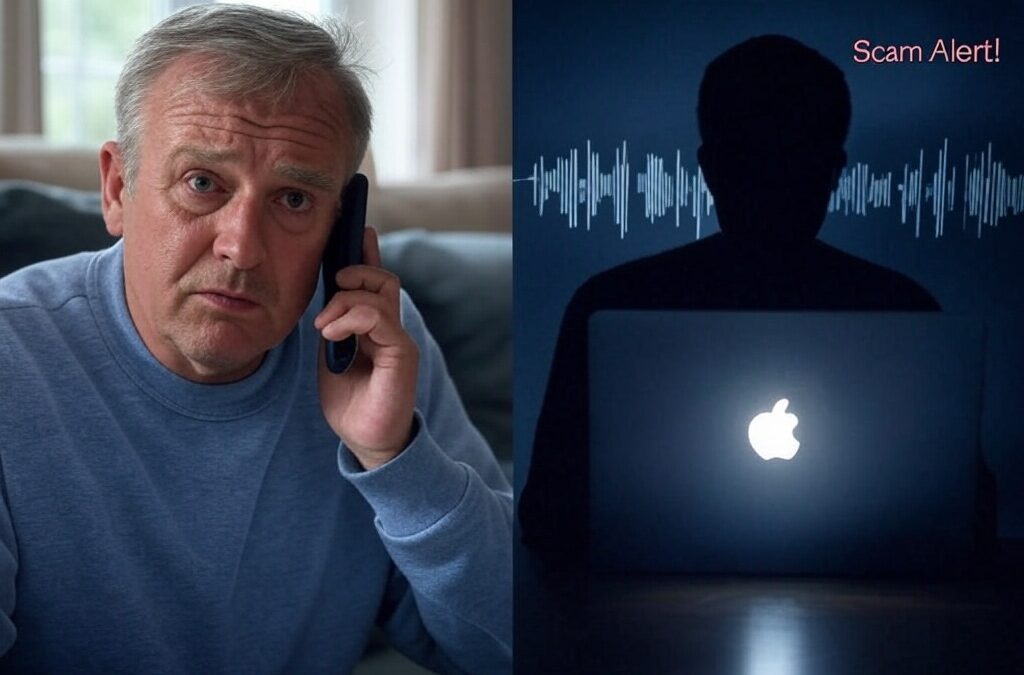Imagine answering your phone and hearing your grandchild, voice shaky, saying they’re in jail and need money fast. You’d want to help, right? Now picture this: it’s not them—it’s a scammer using fancy tech to copy their voice perfectly. This isn’t science fiction; it’s happening now, and it’s tricking people out of millions. A McAfee survey says 77% of people who get these fake voice calls end up losing cash. Welcome to deepfake voice cloning scams—the big problem of 2025.
At Robb.Tech, we share Weekly Unsolicited IT Advice to keep you one step ahead. We’ve warned you about things like 23andMe’s data troubles and risky online file converters. Now, we’re tackling a scam that hits close to home—your family and your wallet. Here’s what you need to know and how to protect yourself.
The Scam That Sounds Too Real
Scammers grab just a few seconds of someone’s voice—like a video you posted online or a voicemail—and use tech to make it sound exactly like them. One common trick is the “grandparent scam”: a fake grandkid calls, saying they’re in trouble and need money right away. The FBI saw over 650 cases like this between 2020 and 2021, with people losing more than $13 million. Another case? An 82-year-old lost $690,000 after a fake Elon Musk video tricked them into a bad investment. Here’s the kicker: 53% of us share our voices online every week, giving scammers what they need to pull this off.
Why It’s Spiking Now
Why is this happening more in 2025? The tech to fake voices is cheap and simple now—anyone with a laptop can do it. That clip of you singing “Happy Birthday” or chatting on a video call? Scammers love it. With so many of us working from home or talking online, our voices are all over the place. They’re counting on you not suspecting a call from “Dad” asking for a quick favor. This isn’t just for tech experts—it’s hitting regular folks like you and me.
How to Stay Safe
You don’t need to be a tech wizard to beat this—just some easy tricks. Here are your superpowers to stay safe:
- Make a Secret Code Word
Pick a special word with your family or friends—like “pineapple” or “sunshine.” If someone calls asking for help, ask for the code. No code? Hang up—it’s not them. - Check Before You Help
Get a surprise call? Hang up and call them back using a number you already have—not the one they give you. This makes sure it’s really them. - Keep Your Voice Private
Try not to share voice clips online—like videos or voicemails. Scammers only need a tiny bit to copy you. - Add Extra Locks
Use multi-factor authentication (MFA) on your accounts. It’s like a second key—scammers can’t get in with just your voice or password. - Spot the Fakes
Use a free tool like Trend Micro Check (get it here) to catch fakes. If a call or message seems off, trust your gut and ask a friend to listen too.
Outsmart the Scammers
Deepfake voice scams are growing in 2025, but you’ve got the power to stop them. Tell your family—especially older relatives who might get targeted—and report any scams to the FBI’s Internet Crime Complaint Center (IC3). Together, we can make sure the only voices we trust are the real ones.
Stay smart,
Philip Robb
Owner, Robb.Tech

